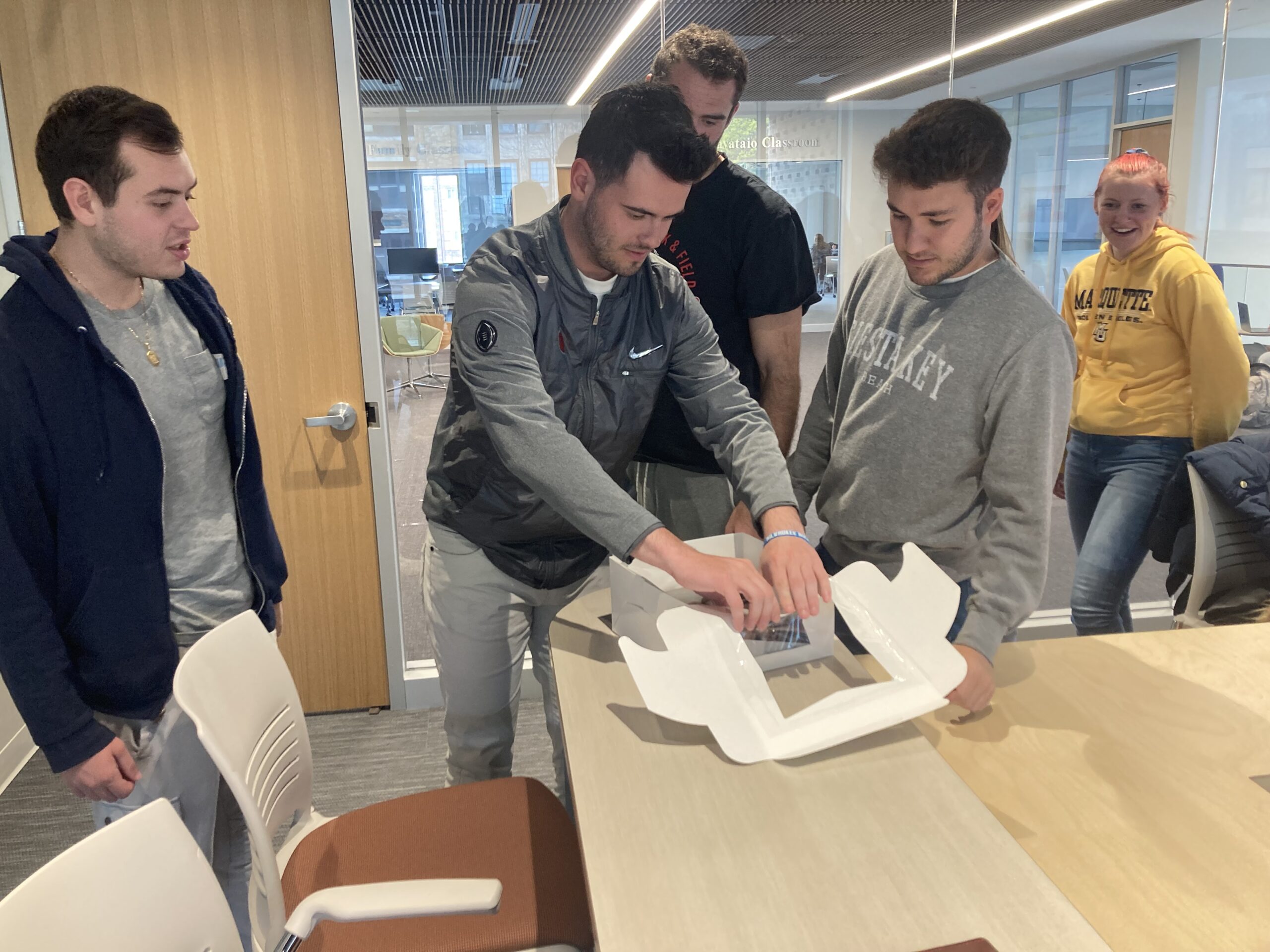The class has no tests or quizzes, yet it’s still one of the most rigorous courses that Nate Moodie has ever taken.
“This class is based on real-world scenarios,” Moodie says.
Students in John Peterson’s Milwaukee Urban Business Learning class are instead evaluated the way most consultants are: by how well they deliver on self-guided objectives.
“We get graded on our deliverables,” Moodie says. “For this Venezuelan restaurant we’re working with, our group came up with deliverables of posting open positions to Indeed, fixing their website, getting their food truck operational and sourcing new equipment.”
Peterson splits the class into two groups, both of which are responsible for assisting three Milwaukee entrepreneurs. One group helps a cohort of startup businesses: a lawyer-turned-motivational speaker, the proprietor of a Christian-themed clothing brand and a holistic health expert. The other works with more established outlets: a home construction firm, an interior decoration company and the aforementioned restaurant.
The idea for the course came from the college’s Applied Global Business Learning program, which gives students the opportunity to help business owners in other countries. Former Keyes Dean of the College of Business Administration Brian Till realized the skills necessary to help a lacework artist in Mexico could just as easily be employed closer to home.
“I’m thinking to myself, ‘well, we have small businesses in underdeveloped parts of Milwaukee, and not all students have the ability to travel,” Till says. “Let’s take that same idea as the Applied Global Business Learning program and let’s do it in our own backyard.”
BizStarts, a small business development service for Wisconsin companies, provides clients and resources for the students. Class participants have two sessions per week. On Mondays, they gather in O’Brien Hall’s new pitch pit to discuss how their work is proceeding and to meet guests from the city’s small business community. They might hear lending director Michael Hetzel from the Wisconsin Women’s Business Initiative talk about how startups are financed or Pink Bakery founder Nubian Simmons detail the challenges of marketing allergy-safe sweets.
Wednesdays are for meeting with clients. While an in-depth sit-down can grow students’ business skills, a canceled meeting or a Zoom chat with a crying baby in the background can teach lessons beyond those that are typically offered in a boardroom.
“Some of our students are coming from wealthier communities and may not come in understanding how language can be a barrier or how lacking childcare can be a barrier,” Peterson says. “One of my groups was constantly having scheduling conflicts with a client. They would say, ‘we scheduled a meeting, and she didn’t even show up.’ I told them, ‘Let’s try to understand why she didn’t show up.’ It turns out it was childcare issue.”
Meetings with clients often happen outside of class time. Sometimes, both parties grab a spare hour to talk in a local Panera, or the students meet them at their business locations.
These get-togethers also give class participants the information they need for their end-of-semester presentations. Each member of the group chooses a business they helped over the prior few months, then tells their peers about what they learned through their experience. Sometimes, the entrepreneur in charge of the organization in question accompanies the student into class.
“We all have to talk about some deliverable we accomplished or some aspect of owning our own business, and that’s a big part of our grade,” says sophomore Lexi King, who hopes to manage a nonprofit one day. “This class is so focused on our time with the client and whether or not we were engaged and delivered what we said we would.”
Students often work with clients who are most in need of assistance. Many of them come from underrepresented communities, do not have formal business education and struggle to get access to the kind of support that more well-connected entrepreneurs enjoy.
“We’re trying to help hire employees, get accounts with cash flow statements and income statements onto a single document, create a website and do social media for our clients –– those kinds of things,” Moodie says.
The types of entrepreneurs who are ideal matches for Peterson’s class are full-time proprietors –– not freelancers or people running a side hustle –– which exposes students to the lifestyle they will have to live if they want to be small business owners themselves. At the same time, the companies are simple enough and at an early enough stage of development that students can leave a lasting, positive impact.
Both King and Moodie have experienced this firsthand. King put together a last-minute t-shirt design for the apparel company she was working with, while Moodie helped his group’s construction company build a new website from the ground up.
“Seeing our client’s excitement for what we created was really special.”
Lexi King
“Seeing our client’s excitement for what we created was really special,” King says. “They were originally designing their logo themselves in free software. Now they saw their brand come to life with a professional design firm and that’s awesome. This is going to be the future of their company.”
“We showed our construction company the website we built, and they told us it was exactly what they were looking for, but never actually thought they would be able to afford.”
This is all going according to Peterson’s plan: to give students the kind of hands-on, broad-based education they could never get by learning out of a textbook.
“They’re internalizing these lessons because they’re seeing it firsthand instead of just talking about it,” Peterson says. “I think this class changes their perspective dramatically.”



